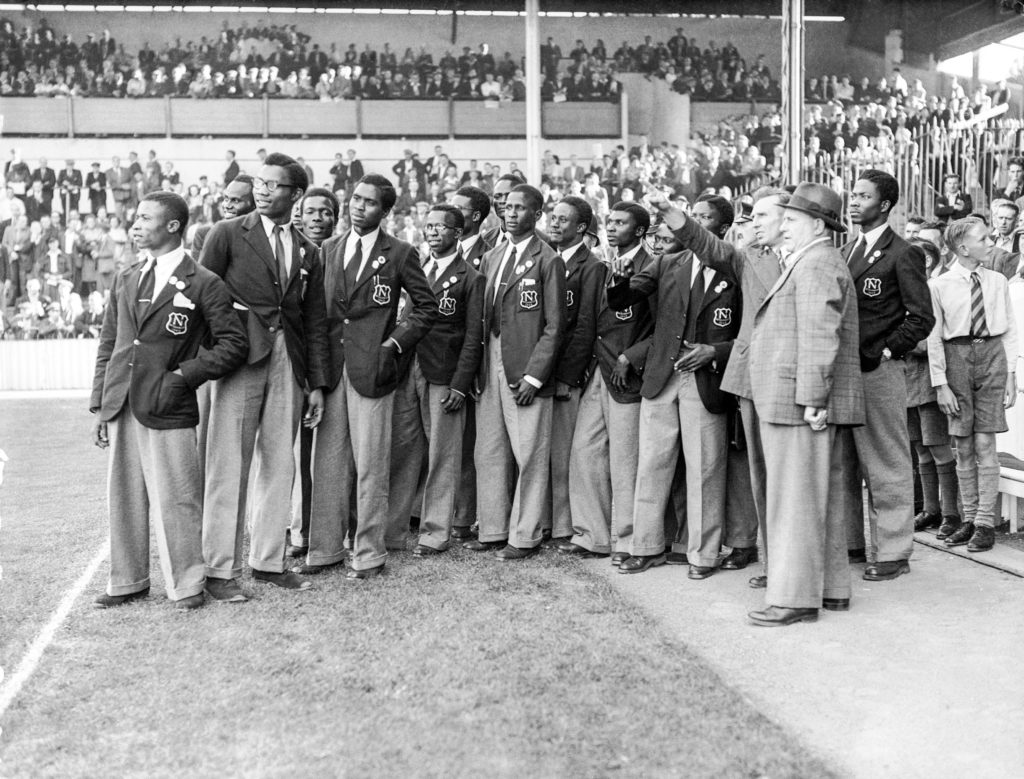Nigerian footballers, some bare-footed, during a training session at Everton's training ground in Liverpool. A squad of fifteen players, the first time a Soccer team has left Nigeria, will tour the United Kingdom playing top amateur sides. Most of the players prefer to play bare-footed and can still drive a ball over 70 yards without boots. (PA Images via Getty Images)
The first time Nigeria’s men’s football team played outside the country, it took them two weeks to reach their destination. They sailed from Lagos to Southampton on board the MV Apapa in August 1949, and every day the 18 players would run around the deck to keep fit.
The team was young, having only played its first international match against Gold Coast — now Ghana — in Lagos in 1938. The tour of England, to test their strength against nine English amateur clubs, was its first major foray on the world stage.
It started well. The opening game against Marine Crosby Football Club was scheduled for just two days after their arrival. The team wore olive green jerseys and white shorts, and only striker Sokari Dokubu wore boots. A crowd of 6 000 watched the Nigerians — christened the UK Tourists for the tour — register a 5-2 upset.
The tour ended with two wins, two draws and five losses. This included a 8-0 thumping by the Athenian League XI, which was largely blamed on the team’s unfamiliarity with football boots. Slippery, wet conditions meant they had to wear them.
Segun Adenuga was only seven years old at the time, but already he was hooked on the beautiful game. When he wasn’t playing on the streets of Lagos Island, he was desperately waiting for news on how the team was faring abroad. Match reports would appear in the West African Pilot — a newspaper owned by Nnamdi Azikiwe, who would go on to be Nigeria’s first president — days after the match took place. “They had fantastic sports writers there like Bonam Ekanem,” recalls Adenuga, who became a prominent journalist and sports writer himself.
 The Nigerian Representative team take a break from their tour of England to watch Tottenham Hotspur play Sheffield Wednesday at White Hart Lane (Barratts/PA Images via Getty Images)
The Nigerian Representative team take a break from their tour of England to watch Tottenham Hotspur play Sheffield Wednesday at White Hart Lane (Barratts/PA Images via Getty Images)
The tour would lay the foundations for Nigeria’s eventual success on the international stage, and even resulted in the first transfers of Nigerian players to European clubs. From that original squad, striker Teslim “Thunder” Balogun would play for Peterborough United and Queens Park Rangers, while Titus Okere earned a move to Swindon Town. (Always a stickler for facts, Adenuga points out that Balogun’s nickname belied the finesse that made him so effective, and lamented the misspelling of his name — it should be Tesilimi Balogun).
On the way home, Nigeria stopped in Freetown for their first official international away match against Sierra Leone. They won 2-0 that day, and also won a new nickname: the Red Devils, after the scarlet shirts they wore for that match. The nickname also resonated with Nigeria’s colonial power: “They were under colonial control and they admired their masters, then they wanted a name that they would be using,” said Adenuga.
It would be more than a decade before the nickname changed. Only when Nigeria became independent in 1960 did the football team change its name to the Green Eagles, after the colour of the flag and the animal on national crest. This evolved later into the Super Eagles of today — who, according to Adenuga, for all their flair and prowess don’t hold a candle to the trailblazing footballers he grew up with.